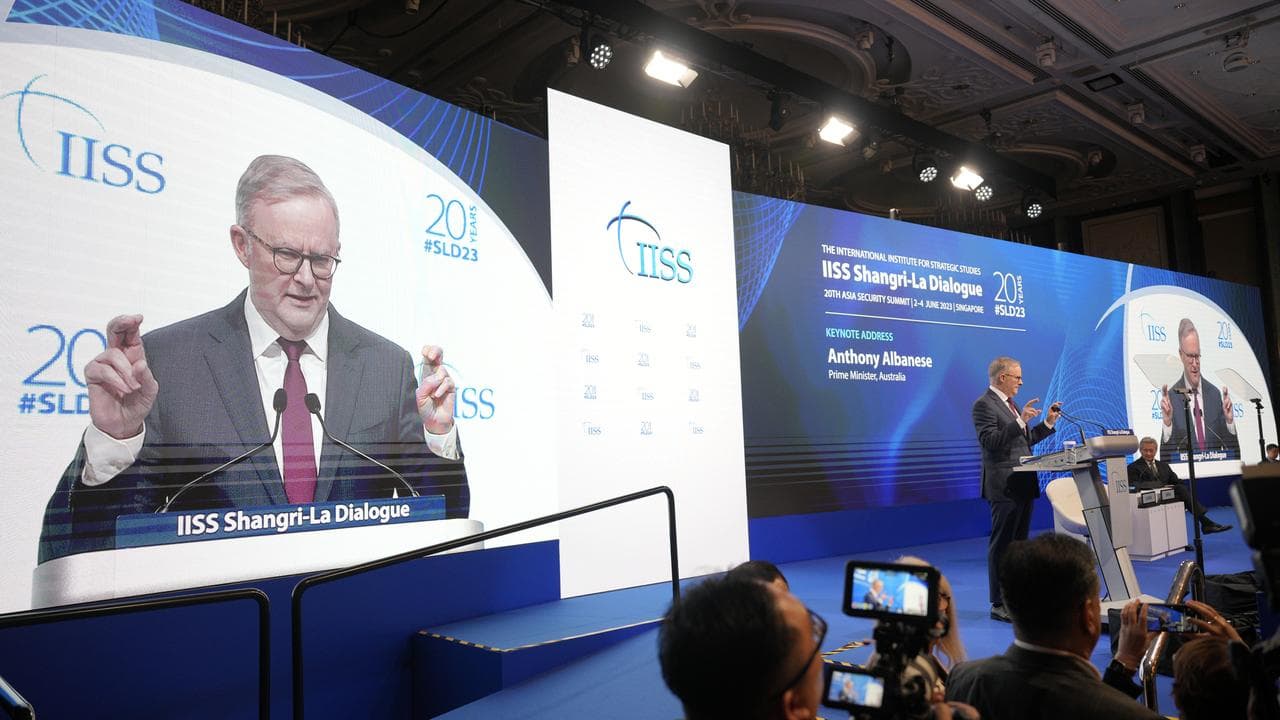
Anthony Albanese has warned about the devastating consequences if the Indo-Pacific is only thought about as the location for the next war.
Conflict in the region is not inevitable, the prime minister told an international audience.
"We sometimes hear our region described as a potential ‘theatre’ for conflict as if this is merely a backdrop, a location, an arena for the ambitions of others," he said during a major foreign policy speech at the Shangri-La Dialogue in Singapore.
"Such a view is entirely, and dangerously, wrong."
But the prime minister acknowledged peace was not assured.
"It’s not the default setting of any part of the world, it has to be built, pursued, defended and upheld," he said.
Mr Albanese used the speech to lend his support to US President Joe Biden's pursuit of guardrails with China, a set of confines the relationship would work within to avoid miscalculations that result in war.
He said such measures would provide "simple and practical structures to prevent the worst-case scenario".
China had also benefited from the rules of the road during its unprecedented economic boom, he said.
"It’s been made possible by a regional architecture that facilitates fair trade, encourages the sharing of knowledge, spurs innovation and builds people-to-people connections," Mr Albanese said.
"This isn’t about a policy of containment, it’s not a question of placing obstacles in the way of any nation’s progress or potential."
Mr Albanese's speech came after a meeting with Singapore's acting prime minister Lawrence Wong.
He was due to meet with Singapore Prime Minister Lee Hsien Loong, but the Asian leader is isolating with COVID-19.
Initiatives launched on Friday included an innovation program on green commerce, a grant program for renewable energy and a corridor to support net-zero shipping.
The bilateral meeting included talks on the defence relationship between the two countries, energy security and expanding trade and investment.
"Now more than ever, our friendship is underpinned by trust, respect and a shared vision for a region that is open, stable and prosperous," Mr Albanese said.
"We know that security isn't just about defence, it's also about our capacity to be less vulnerable to shocks, whether that's a future pandemic, a trade or cyber security shock or international conflict."
Mr Wong said countries in Southeast Asia would not want to be forced to choose sides in the region.
"No one wants to be in a position where we have to either contain China's rise or limit America's presence," he said.
"Any move in either direction will have few takers in the region because no one in ASEAN wants to see a new Cold War."
He said Australia could "help to steer developments in the region towards a path that gives us the best chances to continued stability and growth".
Mr Wong noted the two countries were looking at how to upgrade the ASEAN-Australia-New Zealand free trade agreement.
Mr Albanese will also make his first trip as leader to Vietnam over the weekend, meeting the country's senior leadership, while also marking 50 years of diplomatic relations.




